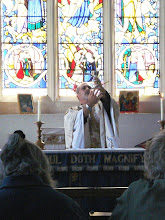 Shame on Britain for emulating the US and its turbo-Capitalism:
Shame on Britain for emulating the US and its turbo-Capitalism:Britain's "dog eat dog" society, which is a poor copy of the United States, was blamed for the conclusion that this country is the worst developed nation in the world to grow up in (sic).Fans of Will Hutton will realise he's been saying just this sort of thing for a long time. He said it recently to the Pope.
So back to religion, this blog's point and my profession and hence the domain about which I can comment most intelligently - if not always intelligibly!
Most indigenous American Christian ecclesial communities have effectively canonised its own neo-Darwinian, evangelical, least-common-denominator creed:
I believe in Jesus so we have a personal relationship; everything else is just man-made religion.It's why I gringe every time I read the notices of vacancies for turbo-Evangelical parishes in the CofE.
I saw one this week about having a 'heart for the lost in the community'. I'd like to say that applies to non-Christians. But what of those normal people in the community Christened by their local vicar? Are they - erm - lost? I wonder what being amongst 'the saved' means - the likely complement to 'the lost' - in real, human terms.
Thankfully Catholics, by affirming that nominal Christianity isn't optimal but is still Christianity, avoid that species of Pelagianism that says salvation is based on making personal decisions, the worst tradition of men to infest the Church since, well, Pelagianism. Nor does Calvin's 'Augustine minus sacraments' position fare any better on the catholicity scale.
Salvation is always God's doing: by grace through the gift of faith given in Baptism - not the individual's. Ephesians is an entire book, not just two verses.
Individualism is quite the American model for nearly everything, whether man-made religion or self-made men. That includes all those home-grown, upstart, entrepreneurial, evangelical ecclesial communities. Based on my reading of the Holy Scriptures as canonised and interpreted by Holy Tradition, there is only one Church as such, i.e., founded not by a mere man but by the Second Person of the Holy Trinity who became the God-man. In the Councils that defined the Canon of Scripture and the Creeds, that Church is one and it's called the 'Catholic and Apostolic - or the authorised abbreviated form: Catholic - Church'.




